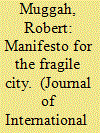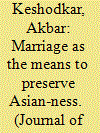|
|
|
Sort Order |
|
|
|
Items / Page
|
|
|
|
|
|
|
| Srl | Item |
| 1 |
ID:
185802


|
|
|
|
|
| Summary/Abstract |
Despite the existence of a large Indian diaspora, there has been relatively little scholarly attention paid to India's relations with overseas Indians after its independence in 1947. The common narrative is that India abruptly cut ties with overseas Indians at independence, as it adhered to territorially based understandings of sovereignty and citizenship. Re-examining India's relations with Indian communities in Ceylon and Burma between the 1940s and the 1960s, this article demonstrates that, despite its rhetoric, independent India did not renounce responsibility for its diaspora. Instead, because of pre-existing social connections that spanned the former British empire, the Government of India faced regular demands to assist overseas Indians, and it responded on several fronts. To understand this continued engagement with overseas Indians, this article introduces the idea of ‘post-imperial sovereignty'. This type of sovereignty was layered, as imperial sovereignty had been, but was also concerned with advancing norms designed to protect minority communities across the world. India’s strategy to argue for these norms was simultaneously multilateral, regional, and bilateral. It sought to use the United Nations, the Commonwealth, and the 1947 Asian Relations Conference to secure rights for overseas Indians. As those attempts failed, India negotiated claims for citizenship with governments in Burma and Ceylon, and shaped the institutions and language through which Indians voiced demands for their rights in these countries. Indian expressions of sovereignty beyond the space of the nation-state, therefore, impacted on practices of citizenship, even during the process of de-recognition in Asia.
|
|
|
|
|
|
|
|
|
|
|
|
|
|
|
|
| 2 |
ID:
138408


|
|
|
|
|
| Summary/Abstract |
After more than a century of steady city expansion in northern countries, the direction of twenty-first century population growth is shifting southwards. Over the next five decades, Africans, Arabs, and Asians will migrate in unprecedented numbers to cities, especially to their slums. Many of these urban settlements are insecure, disorganized, and violent. These are fragile cities and such migrations can threaten their inhabitants, countries, and the wider neighborhood. The analytical focus on fragile cities offers a novel scale when compared to fragile and failing states. It is also one that is preoccupying national policymakers, military strategists, and development experts. Drawing on theoretical and empirical contributions from geography, criminology, and sociology, this article identifies four mega-risks shaping urban fragility—the transformation and concentration of violence, turbo-urbanization, youth bulges, and the relentless penetration of new technologies. It also considers successful approaches to reversing city fragility, including twinning fragile cities with healthier and wealthier ones, investing in hotspot policing, interventions addressing at-risk youth, support for inclusive and cohesive urban growth, and the targeted application of new technologies.
|
|
|
|
|
|
|
|
|
|
|
|
|
|
|
|
| 3 |
ID:
096046


|
|
|
|
|
| Publication |
2010.
|
| Summary/Abstract |
The question of identity, shaped by issues of race and ethnicity, is paramount in the multi-cultural ethnic landscape of Zanzibar. This article examines how the present-day Asian community of Zanzibar, decimated by the 1964 Revolution, when an African insurgence overthrew the islands' Arab rule and expelled the majority of Arabs and Asians, survived in Zanzibar in the years following the Revolution and how, through demarcating communal boundaries and exercising specific marriage strategies, it has managed to maintain its distinct Asian identity. The article is based on anthropological fieldwork in Zanzibar.
|
|
|
|
|
|
|
|
|
|
|
|
|
|
|
|
|
|
|
|
|